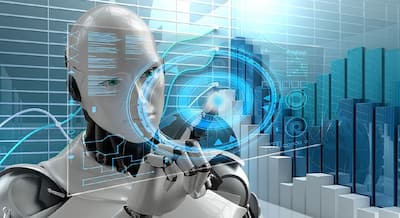
These intelligent machines are revolutionizing the medical sector by introducing advance medical imaging interpretations, early disease detection and personalized treatment planning.
We have come a long way and reached heights of technological advances that are helping humans in medical care too. Since the time of the introduction of AI in medical care, a lot of changes have occurred, from finding the cure of the disease to the early diagnosis of a chronic disease, the journey of Artificial Intelligence in medical care has shown some apparent improvements.
These intelligent machines are revolutionizing the medical sector by introducing advance medical imaging interpretations, early disease detection and personalized treatment planning. What are some main advantage of it?
These technologies are enhancing the accuracy and efficiency that can help promote easy treatment of serious diseases.
Journey Of AI In Medical Sector
Let’s look at the journey of AI in medical sector and fields that it has deeply impacted!
Medical Imaging Interpretation
Medical Imaging is the technique used in processing of imaging interior of a body for the clinical analysis and medical intervention. With the introduction of best AI, these intelligent machines can easily analyse the medical images such as X-rays, MRIs, CT scans and pathology slides that eventually help radiologists and other healthcare professionals in understanding the abnormalities. AI has the capability of noticing the subtle anomalies that might get missed by the human eye but it plays a huge role in the treatment.
Early Disease Detection
The best part about AI machines is that they’re capable of helping in the early detection of diseases that too at earlier stages, enabling timely interventions and better treatment outcomes. This happens as AI can analyze patterns in medical images to detect early signs of conditions like cancer, heart disease, and neurodegenerative disorders. These early detection has saved numerous lives.
Personalized Treatment Planning
There’s always a deep understanding of AI models that can keep a track of huge data. AI can enable personalized treatment plans based on individual patient data, improving treatment efficacy and minimizing adverse effects. It can analyze genetic data, medical history, and lifestyle factors to predict how patients will respond to different treatments. AI can also optimize drug dosages for individual patients, taking into account factors like metabolism and genetic variations.
READ RELATED: Summer Seasonal Depression Is On The Rise: What Are The Symptoms?
Image Segmentation And Analysis
AL is capable of segmenting medical images into region of interest that helps in identifying specific structures or abnormalities. Like in brain imaging, AI can segment different brain regions and identify lesions or tumors.
Data Integration And Decision Support
It is not easy to keep huge data resources saved at a place, this can create confusion and even lead to loss of some important data. But with the help of AI, one can integrate diverse patient data sources, including medical images, electronic health records, and genomics, to provide comprehensive insights for clinical decision-making. Surprisingly, AI can also provide a holistic view of the patient’s health status helping in the better treatment. Decision support systems can suggest potential treatment options based on evidence from similar cases.
Real-time Monitoring And Predictive Analytics
AI can insinuate immediate attention in patient’s health by continuously monitoring the data in real time. On the other hand, predictive analytics can identify trends and patterns that indicate a patient’s condition is deteriorating, allowing early intervention.
Research And Drug Discovery
By looking at the data and research AI can help in finding drugs suitable for the treatment of patients. This eventually lessens the burden on medical professionals.
It can be observed in the article that how AI and machine learning are transforming the field of medicine by enhancing the accuracy and efficiency of medical imaging interpretation, enabling early disease detection, and even presenting authentic plans to individual patients.
Total Wellness is now just a click away.
Follow us on
Don’t Miss Out on the Latest Updates.
Subscribe to Our Newsletter Today!
window.addEventListener(‘load’, (event) => {
$(‘#commentbtn’).on(“click”,function(){
(function(d, s, id) { var js, fjs = d.getElementsByTagName(s)[0]; if (d.getElementById(id)) return; js = d.createElement(s); js.id = id; js.src = “//connect.facebook.net/en_US/sdk.js#xfbml=1&version=v2.3”; fjs.parentNode.insertBefore(js, fjs);}(document, ‘script’, ‘facebook-jssdk’));
$(“.cmntbox”).toggle();
});
});









